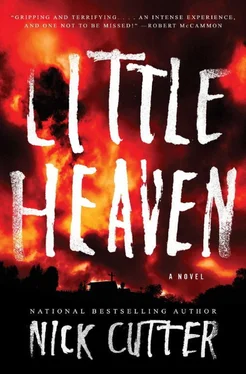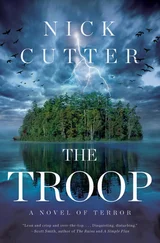He backed out of the gully and drove on to Hamhung. He left Tibbs in the cab. His body was going stiff…
This was the memory that blitzed through Micah’s mind—collecting frozen bodies under the pines—as he now entered the woods encircling Little Heaven with Charlie, Minerva, and Ellen. This earth had the same soft, rich, obliging, somehow cake-like quality. But there was no moss here. The ground simply felt mushy underfoot, as if it had been saturated with thick and fatty oil.
It feels like flesh was Micah’s thought. The waterlogged flesh of a corpse coughed up from the bottom of a lake.
What a stupid thought. But the inkling remained: they were walking on a huge carcass. If they were to dig, their fingernails would scrape its wormy skin. And if they dug into its hide, its black blood would surely gush out, syrupy as crude oil.
They tried to chart a straight path, but the trees and blowdowns made it hard. Micah spotted the light of a torch burning to the east, a paling pinprick. Shouts rang out—“Eli! ELI! ”—but those, too, began to soften as the searchers fanned out in ever-widening orbits.
The light of Micah’s own torch illuminated a ten-foot radius; there was barely enough to navigate by, much less spot the boy. A night in these woods would feel like an eternity to a child. Why would he have taken off? Any number of reasons, Micah supposed. He’d chased an animal. Or his parents had scolded him and he had run away.
Or else something lured him in.
“Needle in a haystack,” Charlie said with a defeated grimace. “I can barely see the fingers at the end of my hand.”
Micah said, “Tell me about those two.”
“What two?” said Charlie.
“The men giving orders.”
Charlie cocked his torch on his shoulder and rubbed his elbow nervously. “The one’s Cyril Neeps. With the longish hair?”
They both had long hair. They were practically identical.
Micah said, “The one with the rifle?”
“That’s the one,” Charlie confirmed. “The other fella is Virgil Swicker.”
“So they’re not brothers?” Ellen said.
“They look it, don’t they? But no. They weren’t part of the congregation back in San Francisco. To be honest, they don’t seem to have much faith at all. I haven’t ever seen their heads bent in prayer.”
“What are they doing here?” said Micah.
Charlie scratched his elbow in a nervous way, like a child called to the front of the class to finish an equation on the chalkboard.
“The Reverend, he brought them on. Guess he figured with the camp being so isolated, and not too many of us having real survival skills, it would be good to have them.”
“I thought the Lord would be your shepherd,” Minerva said.
Charlie gave her a look. “The Reverend had his reasons. He is guided by the Lord.”
Micah noticed that Charlie hadn’t referred to the men as Brother Neeps or Brother Swicker. They had the unmistakable whiff of hired guns. Why take on those two? Maybe, as Charlie said, simply to keep the flock safe… or else to keep the flock in line?
The lights of Little Heaven were no longer visible. Micah’s eye swept the woods for any sign of the missing boy. The darkness rebounded at him, empty and dead.
“We should split up,” he said.
They had already drifted into two distinct parties. Micah and Ellen on one side. On the other, Charlie and Minerva.
“Boy, girl, boy, girl—is that what you’re thinking, Shug?” Minerva said archly. “How orderly.”
Minerva and Charlie moved off in a westerly direction. Micah and Ellen continued straight on.
“Eli!” Ellen shouted. Then, lowering her voice: “Poor little guy.”
They walked beside each other. Micah could have reached out and taken Ellen’s hand. He could smell her: campfire smoke and sweat and something sweet, too, that smelled a little like field berries.
“Are you well?” he asked, just to say something. It was not like him at all.
“I’m okay, considering. Nate and Reggie are here, at least. But they don’t look well, Micah. Nobody looks well. Is that just me thinking it?”
“It is not just you.”
“Right? Everyone looks… sick. The guts vacuumed out of them—the vim, the vitality. A bunch of shambling undead.”
It wasn’t just the people in Little Heaven that set off Micah’s alarm bells. It was the thing or things that had chased them the night before, too. Things Micah assumed must have been bears or wolves. But they hadn’t moved like that, and when he caught a glimpse of their bodies in the flare’s sputtering light—that heart-stopping flicker of movement—in that split second he thought: These are like no creatures I have ever encountered. Those creatures, and the shower of dead birds, and the denizens of Little Heaven, and the soft give of the ground underfoot, and the way the darkness melted unpleasantly into his bones… everything was a bit skewed, a degree off center. None of it seemed odd enough to raise a panic over—you could convince yourself that it was just the weak-nelly dread that domesticated humans felt nowadays, after spending most of their lives in well-lit cities. This was life in the woods. It was dangerous, full of threats. And his experiences in Korea and afterward had enabled Micah to operate calmly under threat. He did not rattle, even when he should. But maybe that was the true danger: you were lulled into a false acceptance as what had once seemed odd came to feel perfectly natural, and by the time things really started to go south it was too late. You were trapped.
“I don’t know if I can leave without Nate,” Ellen said. She was looking directly at Micah. “I’m not expecting anything from you. I just wanted to say.”
Micah said nothing. But he knew he would not leave Ellen. If he was not exactly a good man, he had always been a loyal one. If he took a job, he finished it. Unless something happened to him that prevented it.
They traced a path through the trees. No sounds filtered out of the darkness: none of the little clicks and whistles and snapping twigs that should be there in a forest teeming with life. But the woods felt arid and lifeless—they could have been walking on the moon.
The ground underfoot went from dark to light. The white of pulverized bone. Micah’s boots kicked through drifts of ash… except it wasn’t that. Nothing had been burned.
“I know where we are,” said Ellen. “I saw it this afternoon.”
Dead. Every tree and bush, every tuft of grass. The vegetation was decimated in a manner Micah had never seen: the bark peeled off trees in brittle shreds, the underlying wood gone a sick bile yellow. He saw no termite bore holes, no blight of any kind. It was as though they had died of old age—they had the look of wretchedly ill seniors at a cut-rate old folks’ home, wasted away with cancers that had rotted their bodies from the inside out.
“It’s only right here,” said Ellen. “Ten, fifteen yards wide.”
She reached out tremblingly. Her fingertips brushed a tree. She recoiled as though she had touched a dead body.
“Do you think Eli would have come this way?”
Micah scanned the route they had just walked. He felt something for just an instant. A presence—a delicate, quick-stepping movement he sensed not with his eye but rather a center of perception buried deep in his lizard brain, wed tightly to the fight-or-flight instinct the human species had developed back when we were as often prey as predator.
Yet he saw nothing with his eye. Just the liquid shiftings of the night.
Or—
Fifty yards down the path. Peeking slyly between the ruined trees.
Peekaboo, I see you.
A face. It hovered ten feet off the ground, a tiny earthbound moon. Not a human face. It wasn’t round at all. More long and curved and vulpine. It was as pale as the moon, too—the jarring white of flesh that had never tasted daylight.
Читать дальше












